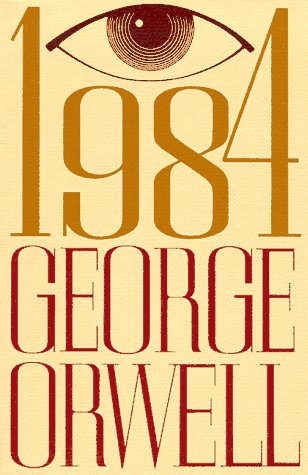All Nonfiction
- Bullying
- Books
- Academic
- Author Interviews
- Celebrity interviews
- College Articles
- College Essays
- Educator of the Year
- Heroes
- Interviews
- Memoir
- Personal Experience
- Sports
- Travel & Culture
All Opinions
- Bullying
- Current Events / Politics
- Discrimination
- Drugs / Alcohol / Smoking
- Entertainment / Celebrities
- Environment
- Love / Relationships
- Movies / Music / TV
- Pop Culture / Trends
- School / College
- Social Issues / Civics
- Spirituality / Religion
- Sports / Hobbies
All Hot Topics
- Bullying
- Community Service
- Environment
- Health
- Letters to the Editor
- Pride & Prejudice
- What Matters
- Back
Summer Guide
- Program Links
- Program Reviews
- Back
College Guide
- College Links
- College Reviews
- College Essays
- College Articles
- Back
1984
Quote: 'He who controls the past controls the future. He who controls the present controls the past.'
Probably the most disturbing aspect of 1984 is the ability of the government, Ingsoc, to effectively alter the past.
Quote: 'If all records told the same tale ' then the lie passed into history and became truth.'
1984 was written in 1949' a much different time from now. After 60 years, is history closer to or further from the alterability presented in the book? The rise of the Internet in the 1990s has brought about a major change in methods of communication, as has the common use of cell phones and similar devices. When the book was written, the only primary methods of long-distance communication were books, radio, television (although they still weren't commonly used in households) , and the telephone. Of these, only one (books) can be considered to be a truly permanent method of storage, and information from radio and television could be stored but would not necessarily be playable after a period of time.
So, with all of those in mind, can governmental control of the past come to be in the way depicted in 1984? It is unknown how many people are employed in the 'Ministry of Truth,' although the building is described as being large enough to have over 3,000 rooms. Not all of these are used for 'changing the past,' although a significant number would most likely need to be. In 1984, however, all that needed to be regularly altered were books, newspapers, and film. The Internet adds a whole additional layer to this sort of revision.
And can information on the Internet ever truly be removed from it? In a 1984-like world, websites like WebCitation and the WayBack Machine would certainly be banned from use, which would make 'archived' versions of pages difficult if not impossible to find. But could a hacker or technical genius recover information which had been deleted or altered so that it is no longer visible to the average person? I think so.
What does this mean, then? Most likely, internet access would need to be taken away from the vast majority of the population so that they couldn't find 'false' information through it. Those who gained access to the Internet would need to 'disappear' from history themselves to prevent the truth from further spreading.
So, let's say that the Internet 'problem' is fixed, that leaves the same things to need revision as there were in 1949. But there are a lot more of those things' more different books, magazines, and newspapers are being printed every year now than there were back then, in addition to a higher quantity of each. The sheer manpower needed to comb through all of the print materials, even with some as-yet-uninvented computer system to help, would be enormous. Plus, with all of those additional materials to be changed, more revisers would be needed to keep everything under control. And, so many additional items would need to be reprinted every day, new, more reusable materials would need to be found to print on, since trees would quickly become limited in supply. The number of people needed to manage all of these functions in a modern world would be beyond comprehension.
There is, however, one other thing to keep in mind. That additional work could easily be too much to handle based on the modern-day political boundaries of countries like the United States, Canada, Russia, and China. However, in 1984, the political lines are quite different, leading to the whole of the modern world consisting of just three major nations. The largest, Oceania, controls all of North and South America, the entirety of Australia, all of the British Isles, and the southern half of Africa. Any coordination across such a large region, even with modern-day communication, would most likely be difficult at best.
So, in conclusion, is it possible? There would be many difficulties in the creation of such a system, but it could probably be done. The sheer amount of work that would be required would probably prevent any concerted effort until there is technology that can basically automate the entire system, so it's a long way off if it does happen. Revision to history happens accidentally today; when a fact is mistaken in one place and then becomes such a widely-heard rumor that it is treated as fact. However, an actual attempt to forcefully alter the past isn't likely to be possible any time soon.
Similar Articles
JOIN THE DISCUSSION
This article has 0 comments.

